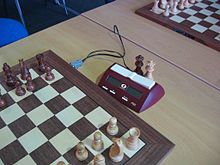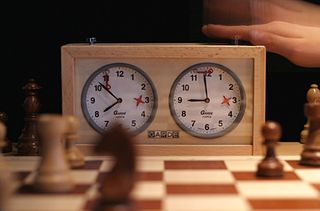
A chess clock consists of two adjacent clocks with buttons to stop one clock while starting the other, so that the two clocks never run simultaneously. Chess clocks are used in chess and other two-player games where the players move in turn, and in some legal settings where each side is allotted a specific amount of time for arguments. The purpose is to keep track of the total time each player takes for their own moves, and ensure that neither player overly delays the game.

The rules of chess govern the play of the game of chess. Chess is a two-player abstract strategy board game. Each player controls sixteen pieces of six types on a chessboard. Each type of piece moves in a distinct way. The object of the game is to checkmate the opponent's king. A game can end in various ways besides checkmate: a player can resign, and there are several ways a game can end in a draw.
This glossary of chess explains commonly used terms in chess, in alphabetical order. Some of these terms have their own pages, like fork and pin. For a list of unorthodox chess pieces, see Fairy chess piece; for a list of terms specific to chess problems, see Glossary of chess problems; for a list of named opening lines, see List of chess openings; for a list of chess-related games, see List of chess variants; for a list of terms general to board games, see Glossary of board games.
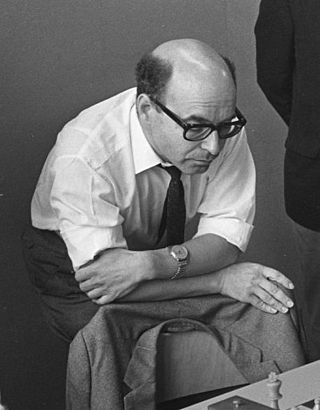
David Ionovich Bronstein was a Soviet and Ukrainian chess player. Awarded the title of International Grandmaster by FIDE in 1950, he narrowly missed becoming World Chess Champion in 1951. Bronstein was one of the world's strongest players from the mid-1940s into the mid-1970s, and was described by his peers as a creative genius and master of tactics. He was also a renowned chess writer; his book Zurich International Chess Tournament 1953 is widely considered one of the greatest chess books ever written.
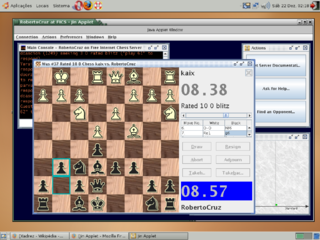
The Free Internet Chess Server (FICS) is a volunteer-run Internet chess server. It was organised as a free alternative to the Internet Chess Club (ICC), after that site began charging for membership.
A draw or tie occurs in a competitive sport when the results are identical or inconclusive. Ties or draws are possible in some, but not all, sports and games. Such an outcome, sometimes referred to as deadlock, can also occur in other areas of life such as politics, business, and wherever there are different factions regarding an issue. In some sports, such as cricket, a tie and a draw have different meanings.
Overtime or extra time is an additional period of play specified under the rules of a sport to bring a game to a decision and avoid declaring the match a tie or draw where the scores are the same. In some sports, this extra period is played only if the game is required to have a clear winner, as in single-elimination tournaments where only one team or players can advance to the next round or win the tournament.

Fast chess, also known as Speed chess, is a type of chess in which each player is given less time to consider their moves than normal tournament time controls allow. Fast chess is subdivided, by decreasing time controls, into rapid chess, blitz chess, and bullet chess. Armageddon chess is a particular variation of fast chess in which different rules apply for each of the two players.

In sports, a time-out or timeout is a halt in the play. This allows the coaches of either team to communicate with the team, e.g., to determine strategy or inspire morale, as well as to stop the game clock. Time-outs are usually called by coaches or players, although for some sports, TV timeouts are called to allow media to air commercial breaks. Teams usually call timeouts at strategically important points in the match, or to avoid the team being called for a delay of game-type violation, such as the five-second rule in basketball.
In gridiron football, clock management is an aspect of game strategy that focuses on the game clock and/or play clock to achieve a desired result, typically near the end of a match. Depending on the game situation, clock management may entail playing in a manner that either slows or quickens the time elapsed from the game clock, to either extend the match or hasten its end. When the desired outcome is to end the match quicker, it is analogous to "running out the clock" seen in many sports. Clock management strategies are a significant part of American football, where an elaborate set of rules dictates when the game clock stops between downs, and when it continues to run.

The rules of basketball are the rules and regulations that govern the play, officiating, equipment and procedures of basketball. While many of the basic rules are uniform throughout the world, variations do exist. Most leagues or governing bodies in North America, the most important of which are the National Basketball Association and NCAA, formulate their own rules. In addition, the Technical Commission of the International Basketball Federation (FIBA) determines rules for international play; most leagues outside North America use the complete FIBA ruleset.
In games and sports, a tiebreaker or tiebreak is used to determine a winner from among players or teams that are tied at the end of a contest, or a set of contests.
In most levels of professional American football, the two-minute warning is a suspension of play that occurs when two minutes remain on the game clock in each half of a game, i.e., near the end of the second and fourth quarters, and overtime. Its effect on play is similar to that of a timeout: the game clock stops and the teams gather to discuss strategy. The suspension of play is two minutes long, the same as the short two-minute intermissions between quarters within each half. Its name reflects its origins as a point in the game where the officials would inform the teams that the half was nearly over, as the official game clock was not displayed in the stadium at the time the two-minute warning was created.
Delay of game is an action in a sports game in which a player or team deliberately stalls the game, usually with the intention of using the delay to its advantage. In some sports, the delay of game is considered an infraction if it is longer than that permitted according to the game's rules, in which case a penalty can be issued. Some sports that have a delay of game penalty are American football, Canadian football, ice hockey and association football.

A chess tournament is a series of chess games played competitively to determine a winning individual or team. Since the first international chess tournament in London, 1851, chess tournaments have become the standard form of chess competition among serious players.
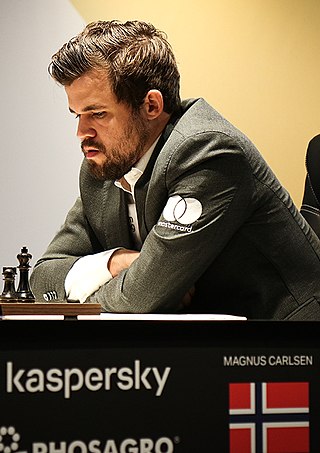
The World Blitz Chess Championship is a chess tournament held to determine the world champion in chess played under blitz time controls. Since 2012, FIDE has held an annual joint rapid and blitz chess tournament and billed it as the World Rapid & Blitz Chess Championships. The current world blitz champion is the Norwegian Grandmaster Magnus Carlsen. Bibisara Assaubayeva from Kazakhstan is the current women's blitz world champion. Magnus Carlsen has won the event a record six times.
In chess played with a time control, time trouble, time pressure, or its German translation Zeitnot, is the situation where a player has little time to complete the required moves. When forced to play quickly, the probability of making blunders is increased, so handling the clock is an important aspect of chess playing. The last move of the time control is especially prone to blunders if players only have a few seconds to play it, and many games have been lost due to poor time management in time pressure.
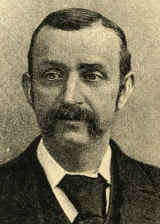
The rules of water polo are the rules and regulations which cover the play, procedure, equipment and officiating of water polo. These rules are similar throughout the world, although slight variations do occur regionally and depending on the governing body. Governing bodies of water polo include FINA, the international governing organization for the rules; the NCAA, which govern the rules for collegiate matches in the United States; the NFHS, which govern the rules in high schools in the USA; and the IOC, which govern the rules at Olympic events.

The FIDE World Fischer Random Chess Championship 2019 (WFRCC) was the first world championship in Fischer random chess officially recognized by the international chess federation FIDE. Previous unofficial championships had been held, with the most recent winner being Magnus Carlsen in 2018. The competition started on April 28, 2019, with the first qualifying tournaments, which took place online and were open to all interested participants; and continued with further rounds up to the quarter-finals, which were also online. The semi-finals and final were played over the board between October 27 to November 2, 2019, in the Henie Onstad Kunstsenter in Bærum in Norway. The winner of the final was Wesley So, defeating Magnus Carlsen 13.5–2.5, to become the first FIDE world champion in Fischer random chess. Over the course of the competition, various time controls were applied, with longer games being weighted more heavily.
The Eiō (叡王) is one of the eight major titles of professional shogi cosponsored by Fujiya Co. and the Japan Shogi Association (JSA). The tournament initially started out as a non-title tournament in 2015, but was upgraded to major title status in May 2017. The current Eiō title holder is Sōta Fujii.
